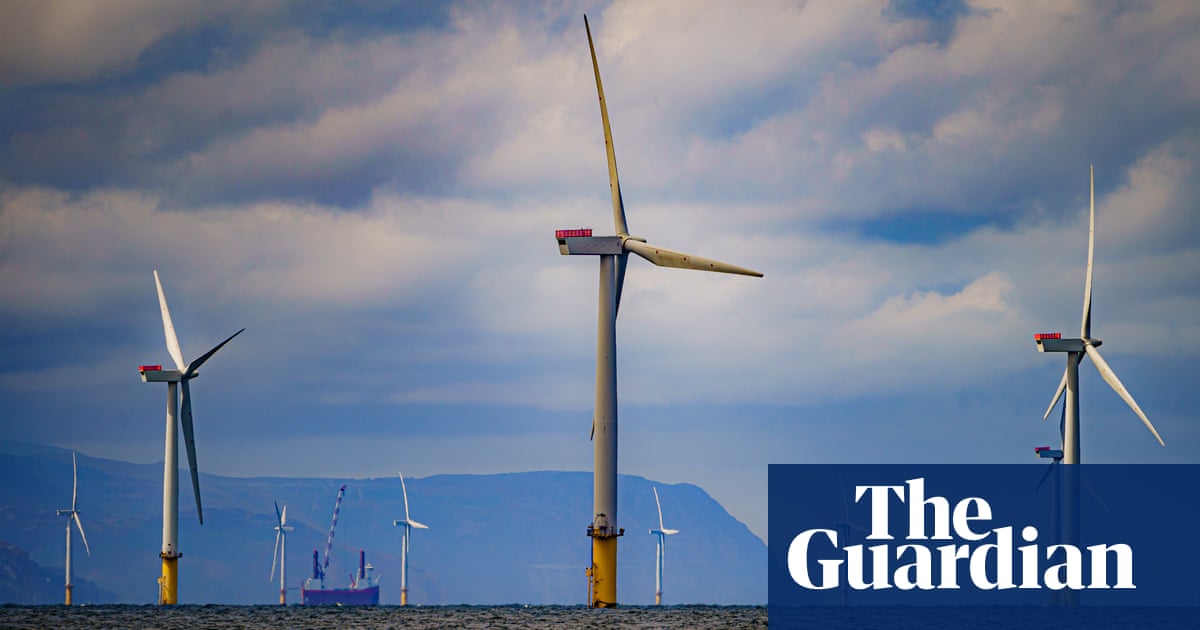The UK is to woo global green investors, including those scared away from the US by theactions of Donald Trump, by offering cash and infrastructure improvements to encourage companies to set up manufacturing plants and supply chains.
The government will bring forward £300m for offshore windfarms, an area in which the UK retains a lead, and has invited banks and major international companies to a60-country summitin London this week.
Ed Miliband, the energy secretary, has written to dozens of global investors citing the UK’s industrial strategy and commitment to moving to low-carbon electricity by 2030.
“We are looking at opportunities all over the world to attract clean energy investment and are setting up conversations with companies from all countries, to ensure the UK can be a winner in the global race for the clean industries of the future,” a government source said.
Under the US presidency of Joe Biden, whoseInflation Reduction Actoffered billions in incentives for low-carbon technology manufacturing, international investors flocked to America.
But renewable industry insiders say many companies have been spooked by the actions of Trump, who hasdeclared his scorn for wind and solar energyand promoted fossil fuels. That leaves some investors reconsidering their US plans for fear of losing money.
Last week the Trump administrationordered a haltto work on a new windfarm off the coast near New York owned by the Norwegian company Equinor. “That kind of thing really worries investors,” said one insider. “Nobody knows what will happen next.”
On Thursday afternoon, Keir Starmer will address theenergy security summit, which is being held in partnership with the International Energy Agency, He will vow to double down on the UK’s commitments to a low-carbon economy despite attacks on net zero from the Conservatives and Reform UK.
Starmer said before the summit’s start: “Let my message to the world go out: come and build the clean energy future in Britain.”
Ajai Ahluwalia, the head of supply chain at RenewableUK, a trade association, said: “US companies are already interested in investing in the UK’s rapidly expanding clean energy sector, for example in helping to develop ports for the offshore wind industry.
“The global uncertainty currently being caused by President Trump’s ever-changing policies on tariffs, and his opposition to clean energy, mean that the UK has an even greater opportunity than before to provide a stable, attractive market for international investors in renewables.”
Labour has pledged £8.3bn to Great British Energy, a nationally owned company that willco-invest in clean energy projectswith the private sector, over this parliament, though this has been called into question as the chancellor, Rachel Reeves, takes an axe to spending.
The US will send a senior official to the summit, which will take place at Lancaster House in London on Thursday and Friday, but China will skip the event.
China’s president, Xi Jinping,attended a small UN online climate meetingon Wednesday with heads of state and the UN secretary general, at which he vowed to press ahead with clean energy despite “some major country’s pursuit of unilateralism and protectionism”.
While the renewable energy industry welcomed the government’s measures, wildlife campaigners raised concerns over changes to the planning system designed to streamline new energy and other developments.
The government tabled an amendment to its planning and infrastructure bill on Wednesday that would mean less consultation at the pre-application stage for “nationally significant infrastructure projects”.
Matt Browne, the head of public affairs at the Wildlife Trusts, said the move was a “misstep” and called for reconsideration.
Sign up toDown to Earth
The planet's most important stories. Get all the week's environment news - the good, the bad and the essential
after newsletter promotion
“The government is proposing changes through the planning bill which would be disastrous for the natural world and undermine infrastructure delivery,” he said.
“Removing the opportunity for experts to improve proposals at an early stage could lead to badly designed infrastructure which harms precious natural areas and destroy communities’ much-loved green spaces.”
Campaigners also called for more focus on the UK’s domestic energy agenda. Mike Childs, the head of science, policy and research at Friends of the Earth, said much more effort was needed to insulate draughty homes, as well as to build renewables.
“Our country has been held hostage by the yo-yo-ing price of dirty fossil fuels for far too long,” he said.
Labour will face opposition to its clean energy plans, and its commitment to reach net zero greenhouse gas emissions by 2050, in the local elections next week.
Reform and the Conservatives arelikely to blame net zero for high pricesand the crisis in the steel industry, though experts have said these arethe result of an overreliance on fossil fuels.
Rob Gross, a director at the UK energy research centre, said the UK’s electricity costs would begin to fall once it had severed its reliance on gas power plants, which generate the most expensive electricity on the grid and set the overall market price.
“If you look across Europe, and you look at the electricity wholesale price, those with the lowest wholesale market prices are those which are least reliant on gas for generation. Those that have the highest prices are those most exposed to gas generation,” he said.
“Our reliance on gas for electricity generation has been decreasing steadily as the share of renewables increases, but it will take several more years before we have severed the link to price formation.”
